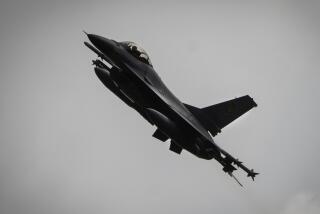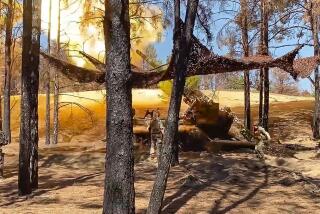Russian Helicopter Crash Kills 14 in Chechnya
MOSCOW — A Russian military helicopter with a deputy interior minister and several other officers aboard exploded and crashed in Chechnya on Sunday, killing all 14 passengers and crew, and first reports indicated that it might have been downed in a rebel attack.
Among those killed was Gen. Mikhail Rudchenko, the deputy interior minister overseeing police forces in southern Russia, one of the highest-ranking Russian officials to be killed in Chechnya since troops reentered the separatist-minded republic in the fall of 1999 to impose loyalty to Moscow.
Citing the work of an investigative team on the ground, the Interfax news agency said the midair explosion “most likely” was caused by a missile. Meanwhile, the Kavkaz Center, an information service for the Chechen rebels, claimed on its Web site that the rebels had scored a direct hit with a Russian-made ground-to-air Igla rocket.
“The Kremlin has been dealt another serious blow,” the site boasted.
However, all parties in the Chechen conflict routinely make exaggerated claims, and Russian officials said they were still trying to determine whether there could be a mechanical explanation for the crash.
The helicopter, an Mi-8 transport, went down near Shelkovskaya, northeast of the Chechen regional capital, Grozny, in late morning. Witnesses said they saw an explosion before it fell.
The aircraft had taken off from the main Russian military base at Khankala, outside Grozny, and was flying to Mozdok, a town in the neighboring republic of North Ossetia.
“The exact reason for the explosion of the helicopter has not yet been established,” Maj. Gen. Sergei Babkin, head of the Federal Security Service in Chechnya, was quoted as saying by Interfax. Aside from Rudchenko, the victims included one other Interior Ministry general, three colonels, crew members and bodyguards.
Whether or not the crash was caused by hostile fire, analysts believed that it would prove to be a psychological setback for the Russian side.
“This is another serious reminder that the authorities should stop pretending there is no war going on out there,” said Alexander I. Zhilin, a military analyst with the Moscow News weekly.
“Russia is still waging a war in Chechnya, whatever they choose to call it. And they must start doing something about it. Ignoring it and letting it smolder on its own will not finish it in any foreseeable future,” he said.
Zhilin said that the ongoing campaign, which has been stalemated for most of the last two years, must be brought to a close either through negotiations or by intensifying military activities. In his words, thousands of Russian troops are sitting there “like sitting ducks without any viable strategy.”
If the cause of Sunday’s crash was a rebel attack, Zhilin speculated that elements of Russia’s own forces could have contributed to it by selling information about the flight to the rebels.
“There are lots of contract soldiers and junior officers out there who have already been corrupted beyond recognition and can sell or do anything for cash,” he said.
Zhilin was dubious that the explosion was accidental because, he said, “[important] passengers like these are almost always offered flights on the most reliable machines, with all safety procedures observed.”
Russian President Vladimir V. Putin likens the Chechen rebels to Al Qaeda terrorists in Afghanistan and says they have direct links to Osama bin Laden. He has taken a tough line on negotiations with the rebels, saying their chief demand--independence--is out of the question.
The only meeting in the current conflict between the Kremlin and a rebel representative, in November at a Moscow airport, failed to produce any concrete results.
Russian officials have acknowledged about 3,000 deaths among the country’s troops in Chechnya since war resumed there in 1999, but there are reports of additional deaths almost daily, mostly from gun battles and land mine explosions.
Human rights groups, meanwhile, accuse Russia of tolerating ongoing abuses by its troops in Chechnya--including murders, torture, rapes and robberies--as they carry out “sanitizing” operations to separate rebels from the general population.
Although criticism of Russia’s Chechnya policy in the West became somewhat muted after the Sept. 11 attacks in the United States, European governments and the U.S. continue to urge Russia to seek a negotiated solution with the ousted administration of Chechen President Aslan Maskhadov.
The United States drew Moscow’s ire only Thursday by allowing a State Department official to meet an envoy of Maskhadov’s government in Washington--a decision that Russia termed “an unfriendly step.”
*
Sergei L. Loiko of The Times’ Moscow Bureau contributed to this report.
More to Read
Sign up for Essential California
The most important California stories and recommendations in your inbox every morning.
You may occasionally receive promotional content from the Los Angeles Times.










